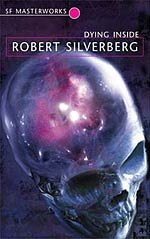
![]() bazhsw
bazhsw
9/6/2014
![]()
So along with reading Harlan Ellison last month I've definitely got a 1970's New York City vibe going on at the moment - it isn't a nice place to be!
David Selig is a telepath - he can read into people's minds and has been able to do so since birth. As he reaches middle age he notices his powers begin to wane both in frequency and intensity. This story explores Selig coming to terms with the loss of his power and is his story of his pretty much unhappy life.
The main premise of the book is that being able to read people's minds is a pretty bad thing. We all know what happens in the darkest recesses of our mind and I'm sure there are certain things we wouldn't want to broadcast to strangers or our loved ones. Our own emotional resilience would be sorely tested if we heard all the negative thoughts or impressions that could be felt towards us in a working day.
This is also a novel of self-pity. Selig is a pretty despicable human being and I suppose a central question is 'Is Selig horrible because of his power or in spite of it'. Indeed, pretty much all the characters in the book have few redeeming features. There is a really interesting idea (and brutally honest) that if we had the gift to reach into people's minds would we use it to benefit others or act out of self interest? An area of interest for me is that of emotional intelligence in relation to leadership theory and also applying it in our daily lives. This focuses on not just what we say and how we say it but also being mindful of how others communicate to us. Picking up on non-verbal cues of others helps generate understanding. What's key is to not use emotional intelligence for manipulative purposes but for engaging with others. Looking into areas of therapy and counselling the ability to use Selig's power could greatly improve the lives of others.
However, Selig does not use his power to help others - it seems he really only uses it to get laid. The only other telepath in the book seems to exploit his power for financial gain. The key difference between the two is that Selig is filled with guilt and self loathing whilst Nyquist (the other telepath) does not.
Horrible teenage boy confession alert - at one point in my teens I know I considered the possibility of how amazing it would be being able to read girls minds to see if I was 'in'. Sure, it would cut out a lot of 'wasted effort' but as this novel clearly demonstrates it reduces the thrill of mutual discovery and excitement. Selig selects sexual partners with the same detachment as someone examining fruit in a market. It truly is a horrible invasion of privacy. One of the saddest factors of this book is that there is probably some truth in that if people did have such an amazing power they would use it to get laid.
Selig is also a horrible racist. In fact racism is persistent throughout the book. Where I am a little concerned with the novel is that I can handle the racism of Selig but I was left with the feeling that I was reading Silverberg's racism too. There's a particular section which reinforces particular stereotypes towards Black people and it is not in Selig's voice - this I find problematic.
The prose in the book is delightful at times, the structure of flashbacks to different points in Selig's life unpeels layers of the story. As we learn more we realise how badly Selig manages his relationships and just how much he 'weirds' people out!
There is an amazing section in the book where Selig experiences a bad LSD trip. I do have a thing for 'bad trip' writing and Selig takes the reader for a wild ride. I felt I was on the rollercoaster, hanging on as Selig had his awful experience.
Overall, not a pleasant read but most definitely a thought provoking read which challenges readers perceptions over how they would act if they could read the minds of others.